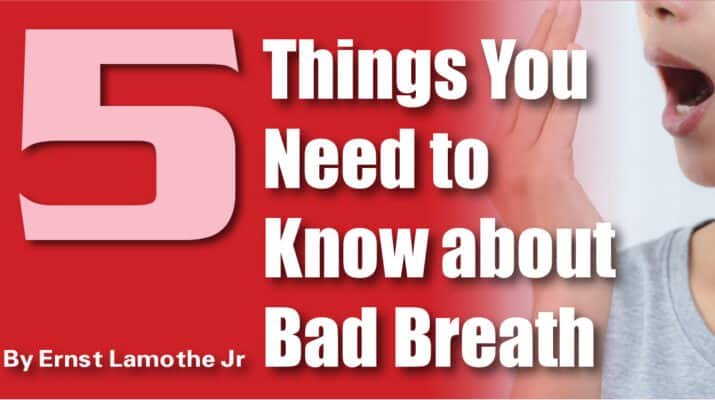By Ernst Lamothe Jr
Bad breath or what is referred to as halitosis, can have many causes and forms. The condition ranges from poor oral hygiene — such as plaque and food debris — to gum disease, dry mouth, gastrointestinal issues and smoking. It can dramatically affect someone’s quality of life.
“We recommend everyone see a dentist at least once a year. Twice a year would be better, especially if you have a dry mouth or are prone to cavities or dry mouth,” said dentist Matthew Hall, director of the General Practice Residency Program at St. Joseph’s Health in Syracuse. “The most important lifestyle changes to prevent bad breath is to see your dentist regularly, practice good oral hygiene and keep your mouth moist, especially if you sleep with your mouth open or use a CPAP machine.”
Hall talks about five aspects of bad breath
1. Common causes of bad breath
Oral hygiene and dental care are crucial for the prevention of bad breath. Brushing twice daily, tongue scraping, daily flossing to remove deposits between the teeth and regular professional visits and cleanings to prevent plaque buildup can help maintain a healthy smile and fresh breath.
“Bad breath is caused by a variety of factors. It is commonly caused by bacteria that is always present in the mouth. It can also occur as a side effect of some medications, specifically allergy or hypertension drugs,” said Hall. “People with sinus problems, inflamed tonsils and liver or kidney disease [are more affected]. The best way to identify the cause is to get checked by a dentist or physician.”
2. Foods that worsen breath
Certain foods can significantly impact breath odor, both positively and negatively. For instance, garlic and onions are well-known culprits due to their sulfur compounds, which can linger in the mouth and bloodstream after consumption, leading to persistent bad breath. On the other hand, crunchy fruits and vegetables like apples, carrots and celery can help freshen breath by stimulating saliva production, which washes away food particles and bacteria. Dairy products, particularly yogurt, may also help neutralize odors and support oral health. Additionally, drinks like green tea and water can play a crucial role in maintaining fresh breath by keeping the mouth hydrated and reducing acidity, which can lead to halitosis. Overall, being mindful of your diet can contribute to better breath and overall oral hygiene.
“Most foods will have a link to bad breath if proper oral hygiene such as brushing and flossing is not performed regularly. Some foods are especially notorious for contributing to bad breath including coffee, garlic, onions and nacho chips,” said Hall. “People who sleep with their mouth open will have a dry mouth that lends itself to causing bad breath. Smoking is a habit that will also contribute to bad breath.”
3. Role of hygienists and oral care
Regular dental visits help catch problems early and allow for timely treatment. Seeing the dentist every six months is usually recommended for most people at low risk for cavities or gum disease. Those with a higher risk may benefit from visits every three to four months. Your dentist will determine the ideal schedule based on your individual needs, helping to prevent minor issues from turning into more serious problems.
“Oral hygiene is the most important factor in preventing bad breath. Brushing for two minutes twice daily and flossing at least once a day are key. Adding mouthwash to the oral care routine can also be helpful,” he added.
4. Medications contribute to bad breath?
Certain medications can contribute to bad breath through various mechanisms. Many medications, including antihistamines, antidepressants and blood pressure medications, can reduce saliva production. Saliva is essential for keeping the mouth moist and washing away food particles and bacteria. Some medications can change taste perceptions or alter the sense of smell, which can affect how odors are perceived and contribute to bad breath. Medications that contain sulfur compounds or other odor-producing ingredients can lead to foul-smelling breath.
“Certain medications will dry out the mouth which can contribute to bad breath,” said Hall.”The most common medications that have this effect are antihistamines and allergy medications, some medications for high blood pressure along with many antidepressants and antipsychotics can cause dry mouth.”
5. Bad breath treatment
Treatment for bad breath focuses on addressing the underlying cause, including gum disease, dry mouth, or throat and nose issues. Professional dental cleanings and improved oral hygiene practices, such as tongue scraping and flossing, are essential.
“The best way to treat bad breath is to make a habit of having excellent oral hygiene and staying hydrated, to prevent dry mouth. Using mouthwash can also help. If there is an underlying gum disease or medical condition, getting seen by your doctor and dentist is critical,” he added.

